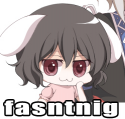>>22269
> I only speak English, and have no idea how the Japanese language works.
Okay. I'm going to lie a little, and I'm going to oversimplify a lot, but you're not going to learn how to pronounce /ɤ̃/ or /ɯᵝ/ here.
????????????????????????
a as in
father.
ABSOLUTELY NEVER AS IN cat.
e as in
egg.
i as in
liter.
o as in
topos.
u as in
vuvuzela. Not as in
use, unless there's actually a
y there.
Every goddamn time. No fucking exceptions. No, not even when there's two of them in a row; you just stretch it out longer. Don't reduce the vowels to a schwa either (/ə/, which I
think is your "uh" sound) if you can possibly help it.
This means:
*
ai is always the sound in
skies,
ABSOLUTELY NEVER AS IN air.
*
ei is always the sound in
space,
ABSOLUTELY NEVER AS IN either.
*
ou is always the sound in
bowl,
ABSOLUTELY NEVER AS IN you.
These are the
only diphthongs; pronounce
all other vowel "combinations" as separate syllables. Combinations like
au and
ae and
ie and
oe and
ue and
ui aren't special like they are in English. (Hell, even
ai,
ei, and
ou barely are.)
y is not a vowel.
Ever. It can be a real consonant, or it can fit between a real consonant and its vowel, but it's always pronounced like in
yak and
yolk and
yule.
The closest thing to an exception is this: when
u or
i are between two of
p, t, k, ch, s, ts, or
sh, drop 'em. (Technically, you're supposed to devoice them—whisper them, basically—but what the hell. Especially after an
s,
sh, or
ch; even in Japanese they just sort of subsume the vowel in question.)
This is the total opposite of what English does—we often voice
s (and in American English,
t) when it falls between two vowels.
Never do that for a Japanese word. s is always pronounced as in
suit, not as in
using.
???????????????????????????????????????? ???????????? ???????????????????????????????? ????????????????????????
Consonants are always attached to the
following vowel, and there's
always a following vowel. The only exception is
-n, which acts more like a vowel anyway.
(Sometimes that's written
-m before a
p or
b, as in
sempai vs.
senpai. It's the same underlying sound and the same Japanese character; it's just some English-speakers prefer to represent the sound change. I don't see the point, myself: the "n" in English "can be" is usually pronounced as an /m/, after all. I mention this only so that you'll know what to do if you see an
-m, i.e., nothing special.)
ts,
sh, and
ch count as one consonant.
ts only occurs before
u; that's just what happens to a
t before a
u in Japanese. Sometimes you'll see
dzu; same deal with
d. Pronounce it like
ju.
Pronounce
g as in
girl, never as in
giraffe.
c doesn't occur outside of
ch.
????????????????????????
Always treat final
-hime as a suffix, even if it's not written as one. Ignore it when finding the accent.
Sometimes initial
ko- is a prefix:
Koakuma, Koishi, Kogasa, and
Kosuzu, but not
Konohana-Sakuyahime. Sorry, just remember those.
Long syllables (doubled vowels, the three diphthongs) and closed syllables (
-n) are always accented. (There are no long closed syllables. Break that up into a short and a closed: see
Udongein below.)
If the word's just a string of four or more short syllables, the next-to-last syllable is accented.
Otherwise, if the first two syllables are both short (one vowel each, no
-n in sight), the first syllable is accented.
Finally, put the suffixes back on. If you're left with three or more unstressed syllables in a row, add secondary stress. You'll know where.
(This isn't Japanese. Japanese doesn't
do stress accent. This is almost all
English wackiness.)
????????????????????????????????
*
Ei.ki
Shi.ki
*
Kei.ne
Ka.mi.
shi.ra.
sa.wa
*
Ha.ku.
gyo.ku.
rou
> yes, gyo is one syllable; remember that y is never a vowel
*
U.tsu.ho
Rei.u.ji (or O.
kuu)
*
Shin.
myou.ma.ru
Su.ku.na
*
Ka.gu.ya
Hou.
rai.
san
*
To.yo.
sa.to.
mi.mi no
Mi.ko
> yes, in that order; practically nobody reverses this one
*
A.ya Sha.
mei.ma.ru
*
Se.ki.
ban.ki
*
Rei.
sen U.
don.ge.
in I.na.ba
> Remember when I said there are no long closed syllables? gein isn't a syllable; it has to be ge + in.
* Mo.
kou Fu.ji.
wa.ra
* A-
kyuu Hi-e-da
*
Ka.ge.
rou I.
ma.i.
zu.mi
> I know, it looks like it should be I.mai.zu.mi; but it's a compound, ima + izumi. Easy mistake to make, though. I had to check.
*
Rin.no.suke
Mo.ri.
chi.ka
> "suke" more or less becomes, as you noted, "ske". Might as well be one syllable to an Anglophone. I was surprised, but it looks like you've got this one.
*
Kou.
rin.
dou
*
Bonus: Wa.ka.
sa.gi.
hi.me
> stressed as "Wakasagi-hime"
*
Bonus: Ko.
a.ku.ma
> ko- is a prefix; ko- + akuma "little devil" is just a nickname.
*
Bonus: Ko.
i.shi Ko.
mei.ji
> similarly ko- + ishi "little rock"
*
Malus: Sa.
na.e
Ko.chi.ya
> ... and I have no goddamn clue why I say it that way.
Oh, and I lied. Unstressed
final a (and I believe final
a always will be unstressed) actually
can be pronounced as a schwa, and it usually is. (Only when embedded in English, of course. Japanese still doesn't have any truck with that.)
????????????-???????????????????????????????? ????????????????????
* "Yamaxanadu" is a compound. "Yama" is Japanese, but "Xanadu" is not; its customary English pronunciation is like Canada, except it's Zanada, except it's Xanadu.
* Nobody really knows what the hell "Cirno" is. It's not Japanese. It
is correctly pronounced "cheer-no", and never you mind why.
* "Flandre" is French and should be /flɑ̃.dʁ/, but fuck that, I just say "Flandrə". "Flandray" and "Flander" are both okay in my book, though. (The Japanese rendering is
Furandooru, but nobody says that outside of Japanese.)
* "Hong Meiling" is Chinese. I rhyme it precisely with "Long Hay King" (but not "long-aching", which has a different stress pattern)... but I don't speak Chinese, so what the fuck do I know.
* "Mystia Lorelei" is basically "Misty-ə Lore-ə-lie". If you want it to end in "-lay", ZUN might have a problem with it, but I don't.
* "Rumia" is not Japanese but isn't going to sound much different if you try to pretend it is.
* "Maribel Hearn" is named after Lafcadio Hearn; it rhymes with "earn".









